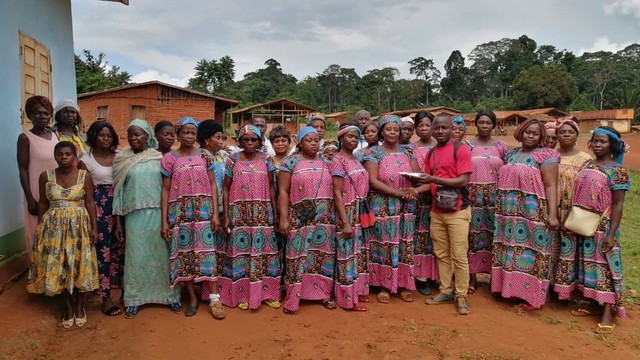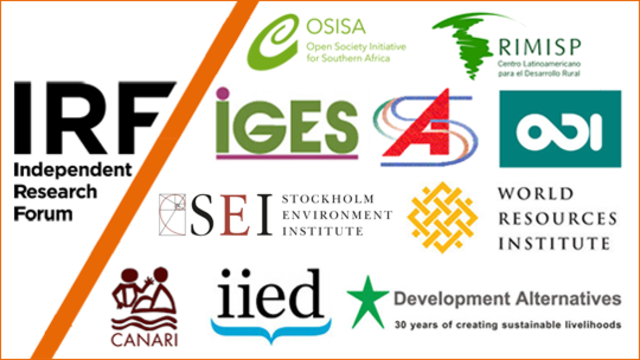Achieving the Millennium Development Goals
The Millennium Development Goals (MDGs) commit the international community to an expanded vision of poverty reduction and pro-poor growth, one that vigorously places human development at the centre of social and economic progress in all countries.
Background
Through critical analysis of target setting, equity, environment and power dimensions. IIED provides a particular focus on poverty reduction, water and sanitation, slum upgrading and tenure security, and ensuring that environment lies at the heart of all sustainable development strategies.
We aim to show how best to include the basic fundamentals of life (access to land, shelter, food, power and rights) in the Millennium Development Goal (MDG) process and build on local organisations' ability to address the priorities of local people. This implies a strengthening of local capacity to assess changes using key indicators designed and monitored at local levels.
IIED has developed a programme of collaborative research, networking and advocacy on the MDGs. Meeting these ambitious goals requires more local action, local capacity and good governance. We have identified policies and practices that enhance these local development processes. We have also challenged inadequate and inaccurate measures of poverty and development progress and tried to increase the influence of civil society on key debates and high-level policy processes (see our series of three booklets on the MDGs for examples and further information).
Project objectives
The Millennium Development Goals (MDGs) commit the international community to an expanded vision of poverty reduction and pro-poor growth, one that vigorously places human development at the centre of social and economic progress in all countries. The MDGs also recognise the importance of creating a global partnership for change, as high-income nations must reform their domestic and international policies related to agriculture, trade, and sustainable development; enhance the effectiveness of their aid programmes; and help poor countries to reduce their debt burdens. For their part, low-income nations must address fundamental issues related to governance, rights and social justice. In all cases, countries must set their own strategies and policies, together with their global partners, to ensure that poor people receive their fair share of the benefits of development.
What are the Millennium Development Goals?
The Millennium Development Goals are an ambitious agenda for reducing poverty and improving lives that world leaders agreed on at the Millennium Summit in September 2000. For each goal one or more targets have been set, most for 2015, using 1990 as a benchmark.
- Eradicate extreme poverty and hunger
Target for 2015: Halve the proportion of people living on less than a dollar a day and those who suffer from hunger. - Achieve universal primary education
Target for 2015: Ensure that all boys and girls complete primary school. - Promote gender equality and empower women
Targets for 2005 and 2015: Eliminate gender disparities in primary and secondary education preferably by 2005, and at all levels by 2015. - Reduce child mortality
Target for 2015: Reduce by two-thirds the mortality rate among children under five. - Improve maternal health
Target for 2015: Reduce by three-quarters the ratio of women dying in childbirth. - Combat HIV/AIDS, malaria and other diseases
Target for 2015: Halt and begin to reverse the spread of HIV/AIDS and the incidence of malaria and other major diseases - Ensure environmental sustainability
- Targets: Integrate the principles of sustainable development into country policies and programmes and reverse the loss of environmental resources.
- By 2015, reduce by half the proportion of people without access to safe drinking water.
- By 2020 achieve significant improvement in the lives of at least 100 million slum dwellers.
- Develop a global partnership for development
Targets:- Develop further an open trading and financial system that includes a commitment to good governance, development and poverty reduction nationally and internationally. Address the least developed countries’ special needs, and the special needs of landlocked and small island developing States.
- Deal comprehensively with developing countries’ debt problems.
- Develop decent and productive work for youth.
- In cooperation with pharmaceutical companies, provide access to affordable essential drugs in developing countries.
- In cooperation with the private sector, make available the benefits of new technologies – especially information and communications technologies.
IIED has published a series of briefing papers on MDG related issues - see below.
MDGs Conference 2005
In December 2005 IIED organised an international conference to share what IIED and partners have learned about local institutions that work and their critical role in achieving real and lasting improvements in the lives of the poorest people as well as effective management of natural resources. And to identify priorities for the proposed MDG-based national plans and processes to be put in place as a result of the 2005 UN World Summit decision, and also for the Paris Declaration on aid effectiveness. We published a summary of the key messages that came out of this event.
Hitting the poverty reduction targets or missing the point?
In November 2003 IIED organised an international conference to explore how tensions between global targets and local needs can be used creatively - as opposed to leading to paralysis or mis-direction. Participants came from a wide variety of contexts, with strong representation from Southern organisations focusing on local sustainability and also from donor agencies and international institutions. Key messages from this conference.
Additional resources
Trees, poverty and targets. Forests and the Millennium Development Goals, James Mayers (2007), IIED Briefing Paper
Biodiversity for the Millennium Development Goals: What local organisations can do, Dilys Roe, Ivan Bond (2007), IIED Briefing Paper
International trade in biofuels: Good for development? And good for environment? Annie Dufey (2007), IIED Briefing Paper
Making Poverty Reduction Irreversible: development implications of the Millennium Ecosystem Assessment, Steve Bass (2006), IIED Briefing Paper
How to Make Poverty History: The central role of local organizations in meeting the MDGs, Tom Bigg, David Satterthwaite (2005) IIED
The Millennium Development Goals and Conservation: Managing Nature's Wealth for Society's Health, Dilys Roe, Ed. (2004) IIED
Millennium Development Goals and Local Processes: Hitting the target or missing the point?, David Satterthwaite, Ed. (2003) IIED
Improving Access to Water and Sanitation: Rethinking the way forward in light of the Millennium Development Goals, Gordon McGranahan, David Satterthwaite and John Thompson (2003) IIED Sustainable Development Opinion Papers



